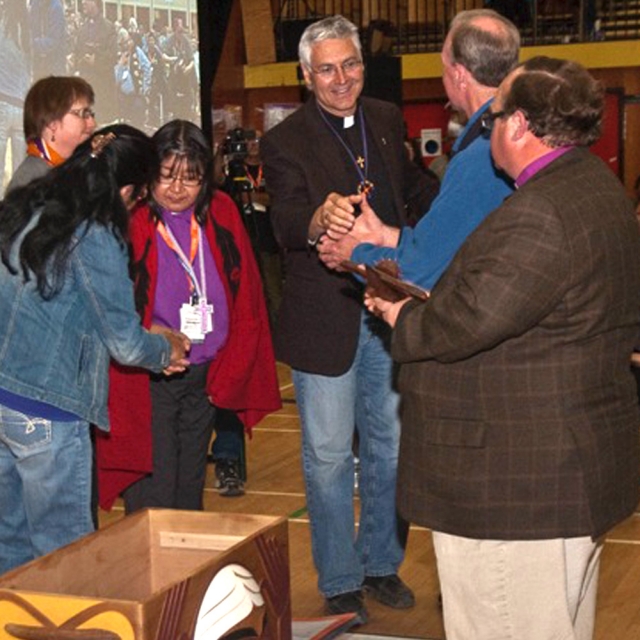"Because of our divisions we have left many hurts," said Anglican Bishop Larry Robertson, suffragan bishop of Mackenzie and Kitikmeot in the diocese of the Arctic.
At one time in Baker Lake when it was time for religion class, students would be split up and sent to learn their catechism either with the Catholic priest of the Anglican priest. When a Catholic student lingered in the Anglican class, the Catholic missionary accused his Anglican counterpart of stealing his children. Years later that same Catholic priest suggested all the children study religion together, said Robertson.
It was Pope John Paul II on his 1984 Canadian visit and his 1987 return to Canada specifically to visit the Arctic who set a new standard for missionaries, said Anglican national native Bishop Marc MacDonald.
"The pope said, if we are to proclaim the Gospel we are to proclaim the rights of the people of the land," said MacDonald.
This November Canada's Anglican and Catholic bishops will mark 40 years of ecumenical dialogue. Internationally, the Anglican-Roman Catholic International Commission has been in dialogue for 50 years.
"The Roman Catholic and Anglican Churches are in dialogue and will continue to be," said Anglican Bishop Lydia Mamakwa, the first native woman elected bishop by her Ojicree people in the Northern Ontario diocese of Keewatin.
The road to reconciliation has been long for Anglicans and Catholics, said Gordon. Native Canadians and mainstream Canada should not let as much history pass before they begin speaking to each other, he said.
"I thank God it hasn't taken 350 years for this event (in Inuvik) to take place," he said.
Catholics, Anglicans make reconciliation gesture to aboriginal people
By Michael Swan, The Catholic RegisterINUVIK, N.W.T. - In the midst of a gathering which seeks reconciliation and healing from the 130-year history of residential schools in Canada, Catholic and Anglican bishops from the north took responsibility for the 400-year-old division between the churches and pledged continued dialogue, co-operation and reconciliation.
"This is a road we're on and there are no exits," said Bishop Gary Gordon of Whitehorse, Yukon Territory.
The gesture of reconciliation and healing came on June 29, day two of the five-day Northern National Event of the Truth and Reconciliation Commission of Canada in Inuvik. About 1,000 native people from all over the far north have gathered with Church and government officials to review the history of the residential schools, hear the stories of school survivors and imagine a new future for native Canadians.
Anglican and Catholic missionaries brought their rivalry with them to northern communities, often dividing communities and families along denominational lines. Catholics couldn't attend the funerals of their Anglican family members. Anglican and Catholic residential school students fought each other on the basis of religious labels.
"These are things we offer regret for, and we want to put them in our past," said Bishop Murray Chatlain of Mackenzie-Fort Smith, N.W.T.
Please support The Catholic Register
Unlike many media companies, The Catholic Register has never charged readers for access to the news and information on our website. We want to keep our award-winning journalism as widely available as possible. But we need your help.
For more than 125 years, The Register has been a trusted source of faith-based journalism. By making even a small donation you help ensure our future as an important voice in the Catholic Church. If you support the mission of Catholic journalism, please donate today. Thank you.
DONATE
